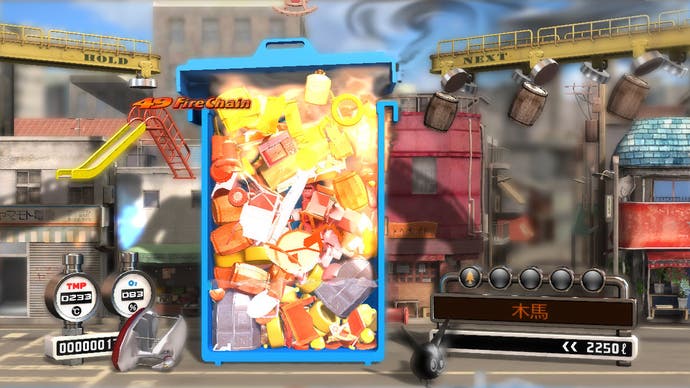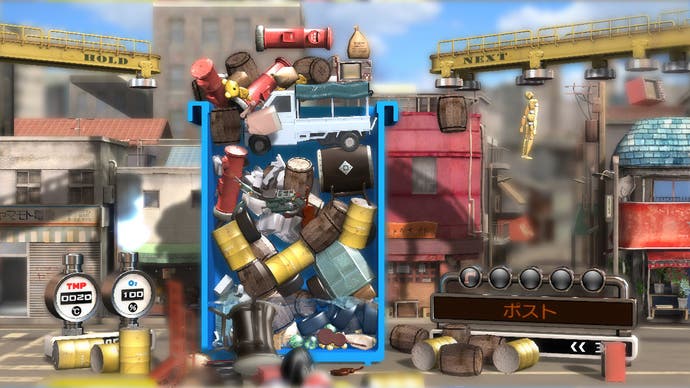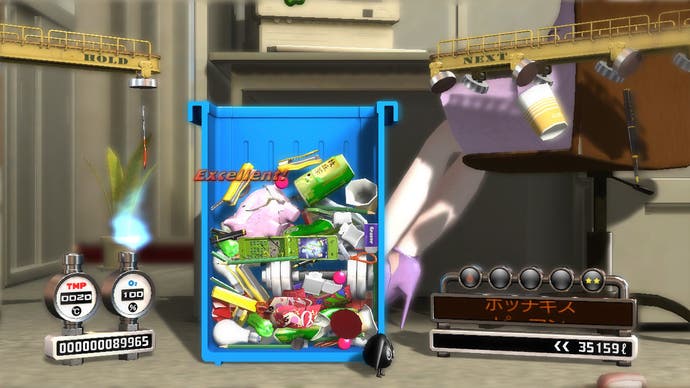Trash Panic
Not rubbish.
(Available in Japan as Gomibako (reviewed) and in Europe as Trash Panic.)
Rubbish is a serious business here in Japan. Every week I have to separate my empty plastic bottles from their very wrappers and caps, because they're not to be thrown out together - and that's before I sort my plastic from glass, glass from metal, food waste from non-food waste, and flicked-through copies of Famitsu from everything else (because paper has to go out unaccompanied, on Thursdays). And no, I can't just sneakily put everything out together: What would the neighbours think? How long would the friendly concierge remain friendly? Besides, the city council generously supplies its citizens with a 40-page pamphlet that explains in unnecessary detail every possible rubbish-related faux pas. I can have no excuses.
Gomibako (literally 'rubbish bin') takes its eco-massaging almost as seriously as Real Japan does, only in different ways - and with a trimmed instruction manual that spans just 21 static screens, thanks. The basic principles here are: 1) Do not dispose of stuff that you really should keep. 2) Crush or otherwise destroy everything you do throw out until it's a fine puree, in order to save bin space. 3) Do not let your bin overflow.

My initial thoughts when playing Gomibako at last year's TGS were: "Oh aye, a junk-themed Tetris? Very clever, that. What's for dessert?" But the game is nothing of the sort. Yes, you have to drop shapes (rubbish shapes) into a depository (a bin-shaped skip), but Gomibako emphasises the arts of composting, incineration and explosive-powered trash obliteration - Tetris-style line formations and Puyo Puyo colour-matching are not part of this program. That means you have to pay attention to what the items are, not merely their shape and size.
Objects are brought into play via magnetised clamps on an industrial conveyor belt, but never at any great pace; and even as they gradually fall into your bin, there remains an option to hold R2 and close the lid for a break from play. There's no time limit on this and there's not even anything to gain from rushing when your bin is full to the brim: Gomibako nearly always promotes strategy over speed. (The only exception is the game's 'bosses', which are in fact large objects - a 108-inch LCD, a truck, a big fat piggy bank - that you need to crush up good within ten seconds, a sufficiently reasonable length of time.) So yes, this is a s-l-o-w puzzle game, but it's better for it. The keys to success are staying calm and making clever moves, and the rewards can be pyrotechnically pretty - drop a lit cigarette to detonate a monster gas canister and you'll see what I mean. A white flash: you'll need sunglasses.

Gomibako is not just some overbaked destroy-'em-up, though: there are times when you need to be cautious like a, uh, Real Person who lives in Real Japan. Items marked with yellow circles and romaji that reads 'mottainai' ('wasteful') are particularly precious. These need to be carefully positioned at the bottom of the bin so that a little Gomy character, who seems to have escaped from ICO, can recover the objects and take them back for safe keeping. If you're careless and throw these objects (which include pieces of art and jewellery) in the bin as you would, say, a punnet of furry strawberries, you'll get hit with a penalty in the form of ironic buckets full of obstructive fruit (or bowling balls or oil drums or mustard-gas cloud pillows), which tumble down from above the screen and do a real nasty job of messing up your stringently planned refuse processing operation. Bad fruit. But then, you should know that it's bad to waste, just like mother used to say - Gomibako forces you to be the responsible individual you always planned on becoming.
It's impressive how well the DualShock 3 is utilised here. Aside from the obvious rumble that matches every big item smash and enhances the sense of scale (in Stage 5 you get to throw away Everest - without rumble it might as well have been an ice lolly), shaking the controller at any point effects a shaking of your bin, and this occasionally dislodges some trapped gunk. That's a satisfying bit of play right there. Equally satisfying are Gomibako's fire- and water-based systems of destructive combos: get a fire going and flammable items will be set ablaze, chaining through contact; fill your bin with water by dropping a washing machine or an iceberg, then plant a glowing blob of bacteria, and you can pull a similar trick with 'rot chains'.

In spite of its fresh take on the puzzle genre (its charm and invention remind me of Sony's Fantavision, but I'm not entirely sure why), Gomibako is let down by its brevity (ah, that's why). Beyond a handful of stages in three difficulty flavours - of which two, it must be said, are pretty trying - there's a 'Mission' mode that does a decent job of a remix for the B-side, and an offline 2P mode that's OK... and that is all.
This is one of those puzzle games you'll play solid for three or four days, rashly declare as being the "Best Puzzle Game Ever" (your friends, wisely, will say that you should wait for a few weeks), but then leave to fester on your PS3's hard drive for some months before you can be bothered to visit it again. Which is to say that Gomibako is a great blast, but doesn't having the staying power of a true giant like Tetris or, more relevantly, Lumines. Still, at 1,500 yen (about a tenner) it makes some kind of sense, and it has novelty bursting out of the slits in its bin liner. Won't someone clean it up?
Gomibako is currently available via the Japanese and Asian PlayStation Stores; it'll likely be released in the UK later this year, possibly as 'Trash Box'.
